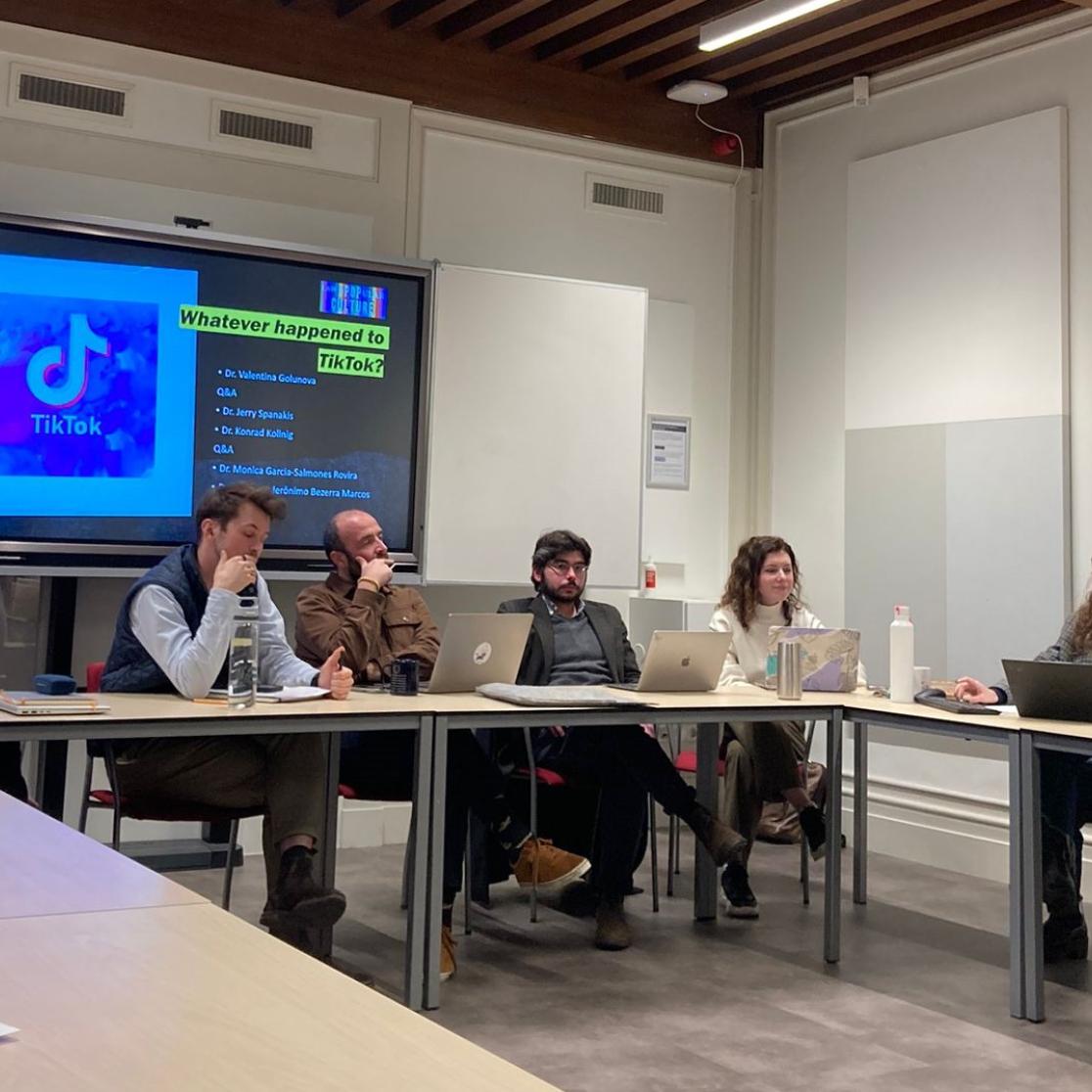In Algorithms We Trust? TikTok in the Digital Cold War
On the 3rd of February 2025, the Law & Popular Culture Research Network hosted the discussion panel “Whatever Happened to TikTok?”, aimed at diving into the current political and social developments around this platform. Moderator Livia Solaro welcomed experts Valentina Golunova, Jerry Spanakis, Konrad Kollnig, Monica Garcia-Salmones Rovira and Henrique Jerônimo Bezerra Marcos. Each speaker brought a different perspective with valuable insights into the current TikTok situation.
Law, Security and Liability
Golunova dedicated her time to raising questions of EU law, and briefing the room on the possibility that the EU might choose to follow the US course of actions against this platform. Her expert opinion as a EU law scholar highlighted the relevance of society and social commitment to this kind of regulations. She made the case that the complex interaction of Member States and stakeholders within the EU makes the European case distinct from the problems and concerns raised by the US.
Shifting the focus of the conversation, Spanakis discussed some of the gaps caused by the black boxes of the algorithms in apps such as TikTok. He broke down possible cause-effect arguments from an engineer perspective, helping the audience try and understand whether or not the claims raised by the US are justified.
Expanding on the legal and technological points made by Golunova and Spanakis, Kollnig dived into issues of privacy, data collection, and the liability aspects of the TikTok case. Building on ongoing conversations around privacy and data collection between regulators across the world, his points left the audience members to decide for themselves what could be the most suitable solutions to these problems.
For context,
as American users opened their TikTok app on the 18th of January, they were met with the message “Sorry, TikTok isn’t available right now”. This was after the Supreme Court passed a bill banning TikTok in the United states, after calls from lawmakers about national security data threats. Shortly after, however, with the Trump administration taking office, TikTok owners were then given a 90 day extension to arrange a sale of the app to a US-owned company.
Social and Global Perspectives
Garcia-Salmones Rovira structured the discussion around the social aspects of the ban, reflecting on whether or not we can talk of a global common good, and on the relationships between sovereign States and companies. Differently from Kollnig, she made it clear that collaboration is a fundamental step to keep companies accountable for data management. Despite the complexity of the problem, States have more in common than these companies, and have the power to take the necessary actions.
Building on Garcia-Salmones Rovira’s points, Marcos made it clear that many of these problems are not new. Throughout history, we have seen continuous accusations of States meddling in the affairs of other States, especially in the Global South. Coming from the Global South myself, the globally positioned inputs from Garcia-Salmones Rovira and Marcos were not only refreshing, but also extremely relevant, as most literature adopts the perspective of the West and Global North.

The Future of Power
This discussion allowed the audience to understand the greater societal problems that the TikTok case entails, and the potential implications of the recent landmark events involving this platform.We live in a time where there are companies that have grown to hold more power and influence than some national governments. Non-elected applications are controlling democratic decisions, and algorithms continue to impact every corner of society. Interestingly, the question of the responsibility to protect members of the public (both users and non-users) was left open by the speakers. Efforts worldwide, such as the Digital Services Act (DSA), focus towards solving the issues that were raised, targeting both social media platforms and app stores. Despite the ongoing conversations around the impact of social media on individuals' everyday life, it is clear that no solution can offer a “one size fits all” type of plan. As several countries plan to deal with social media apps, we can expect to see many changes come out of this technological cold war.
Apps are usually thought of as being borderless, but the TikTok situation shows that in reality they are subject to barriers and borders. As shown by Trump and his “broligarchy”, it is clear that there is an ongoing shift from capitalism to a form of "techno-feudalism”, as the power dynamics in the digital age are controlled by those on the side of technology. The line between the digital sphere and reality is less and less clear, as these two dimensions become increasingly entangled with one another.
Moving Forward Together
What we can take away from this discussion is that, while companies and countries continue to debate their interests, at an individual level it is necessary to step back from those telling us who the enemy is. Helping each other critically engage with these problems — by understanding these technologies and their impact — can empower us to shape our lives.
*About the Author: Jack Z. Jere is a Zambian-American third-year student of Digital Society at the Faculty of Arts and Social Sciences (FASoS). His studies focus on how digital technologies affect social, cultural, and political developments. Having grown up in several Sub-Saharan countries and many international communities, Jack combines his experiences with new knowledge to expand discussions on technology and advocate for global sustainable growth.
-
White Walkers, Red Lines: The IHL Case Against the Night King
Fictional battles have long served as a mirror for real-world anxieties about war, technology, and the limits of law. Season 8, Episode 3 of Game of Thrones, “The Long Night,” provides an opportunity to test the boundaries of international humanitarian law (IHL) by confronting its most fundamental...

-
A Fan’s Guide to Football’s Lex Sportiva: How the CJEU is Changing the Game
On April 28th, I published my very first podcast, which dived into the iconic field of Sports Law. This work was the product of an “Honours Programme Personal Project” supervised by Dr. William Bull. As I look back on this experience, I am honored to share some of the takeaways which Dr. Bull and I...

-
Object- and Problem-Based Learning (OBL & PBL): A Fruitful Amalgamation for the Development of Legal Education
Patrons at the Arthur W. Diamond Law Library at Columbia University (USA) can encounter a duplicate of an automobile wheel that relates to the 1916 court case heard by Judge Benjamin Cardozo in MacPherson v. Buick Motor Co. The wheel is an object that hangs on a wall on the fourth floor of the...
